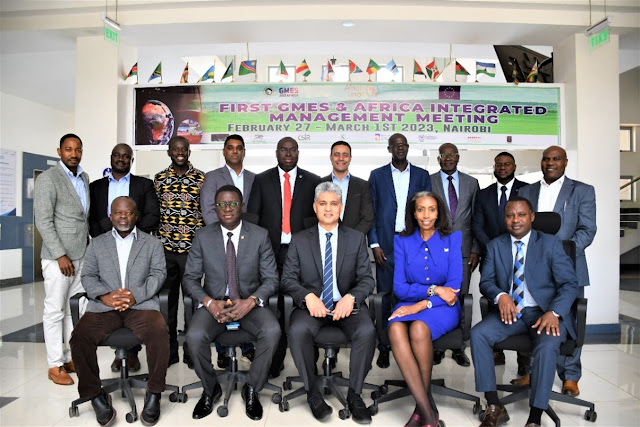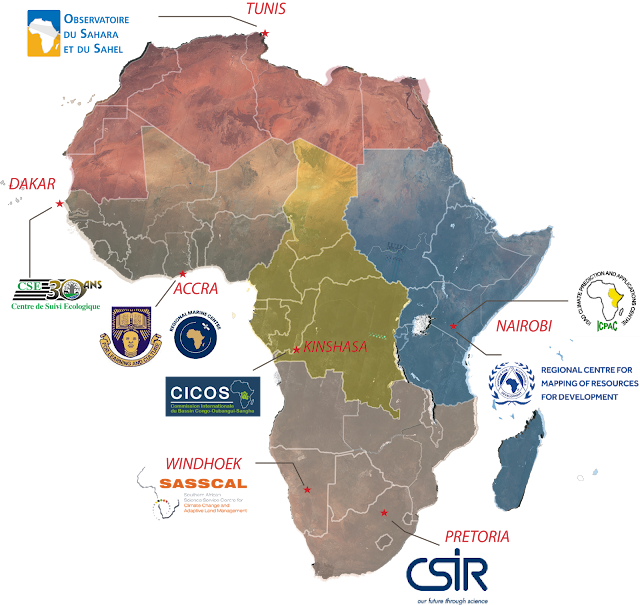GMES and Africa: Leaders convene for integrated management meeting at RCMRD, Nairobi, Kenya
The meeting which was organized by the African Union Commission under the direction of the Coordinator of the Programme brought together the Heads of the Consortia and Project Coordinators, with the aim of sharing strategic and innovative approaches for the sustainability of project
The Global Monitoring for Environment and Security and Africa (GMES and Africa) Consortia leaders led by the Programme Coordinator Dr.Tidiane Ouattara, held an Integrated Management meeting at the Regional Centre for Mapping of Resources for Development (RCMRD) in Nairobi from 27th February to 1st March, 2023.
The three-day gathering offered a forum for improving consortia-to-consortia synergies and exchanging viewpoints on the development of the GMES & Africa Phase II implementation. Dr Tidiane, the programme coordinator, emphasized the need for consortia to work together to ensure that the activities of the programme are well-coordinated and in line with the goals of the African Union. He also urged leaders to cooperate in order to develop a long-lasting capacity for Earth observation in addressing environmental challenges in Africa. Additionally, Dr Emmanuel Nkurunziza, Director General of RCMRD, emphasized the contribution made by the Center in the region in advancing the use of geo-information for sustainable development and the role played by the AUC in the establishment of RCMRD in 1975.


(Many thanks to RCMRD Communication officer, Ms Gladys Mwangi)
The Global Monitoring for Environment and Security and Africa (GMES and Africa) Consortia leaders led by the Programme Coordinator Dr.Tidiane Ouattara, held an Integrated Management meeting at the Regional Centre for Mapping of Resources for Development (RCMRD) in Nairobi from 27th February to 1st March, 2023.
GMES and Africa leadership team led by the Programme Coordinator Dr Tidiane Ouattara, Heads of Consortia and Project Coordinators
The three-day gathering offered a forum for improving consortia-to-consortia synergies and exchanging viewpoints on the development of the GMES & Africa Phase II implementation. Dr Tidiane, the programme coordinator, emphasized the need for consortia to work together to ensure that the activities of the programme are well-coordinated and in line with the goals of the African Union. He also urged leaders to cooperate in order to develop a long-lasting capacity for Earth observation in addressing environmental challenges in Africa. Additionally, Dr Emmanuel Nkurunziza, Director General of RCMRD, emphasized the contribution made by the Center in the region in advancing the use of geo-information for sustainable development and the role played by the AUC in the establishment of RCMRD in 1975.

From right to left: Dr Tidiane Ouattara, GMES and Africa Program Coordinator; Dr Emmanuel Nkurunziza, Director General RCMRD
RCMRD and OSS sign MoU
During the meeting, RCMRD and Sahara and Sahel Observatory (OSS) signed a Memorandum of Understanding that will provide a framework for collaboration and cooperation in research, capacity building and supporting Earth Observation for sustainability development opportunities. Among the potential areas of collaboration in the field of research include data acquisition, sharing, processing, products development and validation, particularly on the development of continental land degradation monitoring under the GMES and Africa programme.
From right to left: RCMRD Director General Dr Nkurunziza and OSS Executive Secretary Dr. Nabil Khatra, signing the MoU
External link: https://africanews.space/rcmrd-signs-mou-with-oss-to-advance-collaborative-efforts-in-research-and-capacity-development/
RCMRD, SASSCAL and CSE sign a Tripartite MoU
Further, Dr Nkurunziza on behalf of RCMRD, signed a Tripartite MoU with the Centre de Suivi Ecologique (CSE) represented by Dr. Cheikh Mbow, and The Southern African Science Service Center for Climate change and Adaptive Land Management (SASSCAL), represented by Dr Jane Olwoch. One area of collaboration will be upscaling and operationalization of the Geoportals to improve on products and services rendered to the end-users on areas Wetlands status maps, change/transition maps, Statistics, Wetland vulnerability index maps and flood monitoring.
From right to left: Dr Nkurunziza Director General RCMRD, Dr Jane Olwoch –Executive Director SASSCAL, and Dr. Cheikh Mbow- Director General CSE, after signing the Tripartite MoU
Launch of Network of Experts for Monitoring Land Degradation by OSS
During the meeting, OSS launched the platform on Network of Experts for Monitoring Land Degradation in Africa. This platform allows professionals, experts and managers of natural resources to exchange information, share knowledge, and consolidate achievements in terms of land degradation and restoration. To join the network, http://projet.oss-online.org/GMES-Africa/jin/
Presentation of the Network of Experts by the G&A OSS-led Project Manager, Dr Evence louis Zoungrana. At the left, the Director General of the CSE, Dr Cheikh Mbow
Visit to GMES and Africa, RCMRD funded Facilities
Digital Photogrammetric Workstation
Further, the leaders made a tour to the new Digital Photogrammetric Workstation (DPWs) funded by GMES and Africa programme. The DPWs are multipurpose workstation for processing complex Earth Observation (EO) data elements such Digital Terrain Mode (DTMs), classification maps, boundary delineations, Contours and other 3-Dimensional datasets from all satellite images including sentinel from Copernicus.
OSS Executive Secretary Dr. Nabil Khatra
E-Station
Funded by GMES and Africa, E-station is an important initiative that leverage the capabilities of Earth observation systems to support sustainable development in the region. The E-Station process data from satellite and enables access of historical data including rainfall, vegetation and fire, that support analysis of Land Degradation. Through the support of the E-station, RCMRD has supplied the Kenya Wildlife Service with statistical map indicating the extent of the wild fires that occurred during February in the Aberdare forest in Kenya. More about the eStation https://estation.jrc.ec.europa.eu/
Left, Dr Jane Olwoch –Executive Director SASSCAL, listening the presentation of the eStation by the RCMRD Expert in Charge
High-level Data Processing Workstations
GMES and Africa program has equipped a 35-capacity computer lab, with high-end level workstations used for Earth observation training and processing data. A total of 400 participants have been trained from East and Southern Africa.
The Consortium leaders in the G&A financed RCMRD Computer lab
Data Office and RCTI hostels
The team visited the ongoing construction of hostels of the Regional Centre Training Institute (RCTI), a facility that will play a key role in strengthening the capacity of member States and other stakeholders in geoinformation. In addition, the team visited Data Centre, which acquires, archives and disseminates Satellite imagery data products.

Visit of the construction site by the leaders of the G&A Consortia and the PMU team
Recommendations
After a three-day deliberation, key recommendations arrived at
- included adoption of emerging technologies to facilitate access to Copernicus data,
- strengthening the relationships with Regional Economic Commissions and decision makers,
- expanding the scope of training to include spatial awareness/capacity building for policy makers e.g. business cases for the socio-economic development and Earth Observation services and lastly,
- raising awareness of GMES and Africa programme through available communication channels.
About GMES and Africa
The GMES and Africa Programme is an initiative of the AUC and the European Commission (EC) aimed at strengthening the capacity of African countries to use EO data and information for sustainable development. The program operates through a series of projects and initiatives that provide African countries with technical assistance, capacity building, and access to EO data and information. The ultimate goal is to support African countries in making informed decisions about sustainable development and to contribute to the achievement of the African Union's Agenda 2063 and the United Nations' Sustainable Development Goals.
More pictures from RCMRD
- https://www.flickr.com/photos/128418604@N04/albums/72177720306386768
GMES and Africa Consortia
- Centre de Suivi Ecologique (CSE) – Dakar, Sénégal, http://www.cse.sn and http://gdzhao-blog.com/
- Council for Scientific and Industrial Research (CSIR) – Pretoria, South Africa, https://www.csir.co.za and (Project site) https://marcosio.org/
- IGAD Climate Prediction and Applications Centre (ICPAC) – Nairobi, Kenya, https://www.icpac.net and http://gmes.icpac.net/
- Observatoire du Sahara et du Sahel (OSS) – Tunis, Tunisia, http://www.oss-online.org/ and http://projet.oss-online.org/GMES-Africa/
- Regional Centre for Mapping of Resources for Development (RCMRD) – Nairobi, Kenya, https://www.rcmrd.org/ and http://gmes.rcmrd.org/
- Southern Africa Service Centre for Climate Change and Adaptive Land Management (SASSCAL), Windhoek, Namibia, https://www.sasscal.org/ and http://wemast.sasscal.org/
- University of Ghana (UoG) – Legon, Ghana, https://www.ug.edu.gh/ and https://gmes.rmc.africa/
- The International Commission of the Congo-Oubangui-Sangha Basin (CICOS) – DR Congo, https://www.cicos.int/ and https://www.cicos.int/gmes-africa/
(Many thanks to RCMRD Communication officer, Ms Gladys Mwangi)

















Comments
Post a Comment